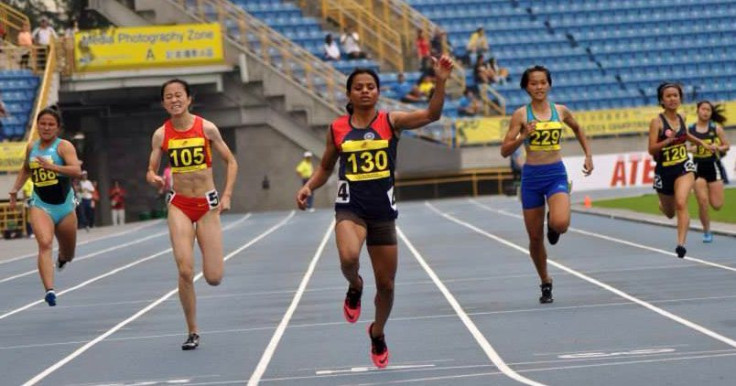Female Sprinter Dutee Chand Has Right To Race Despite High Testosterone Levels, Court Rules

Olympic hopeful Dutee Chand has just won the right to race against other women after winning the case in the Court of Arbitration for Sport (CAS) case that questioned her eligibility due to her high levels of the male hormone testosterone. Monday’s ruling allows the 19-year-old Indian sprinter to compete in national and international races again after being suspended for a year.
"I have a right to run and compete," said Chand, whose condition is known as hyperandrogenism, in a statement after the Court of Arbitration for Sport made its decision. "But that right was taken away from me. I was humiliated for something that I can't be blamed for. I am glad that no other female athlete will have to face what I have faced, thanks to this verdict."
As a result of the ruling, the International Association of Athletics Federations (IAAF), track and field’s governing body, will have two years to prove athletes like Chand perform better as a direct result of their naturally high testosterone levels. It was in 2011 that the IAAF ruled female athletes must have androgen levels below the male range if they wish to compete. A normal female range for testosterone to serum balance is between 0.1 to 2.8 nanomoles per liter, while a normal male’s range is 10.5nmol/L or higher according to IAAF.
When the validity of the IAAF’s regulations of hyperandrogenism were challenged, and later won by Chand, the IAAF published a press release defending its stance. “The regulations aim to preserve fair competition by requiring such athletes either to show that they are androgen-resistant, or else bring those levels down below 10,” it said.
In addition to the governing opposition, top athletes, like marathon record holder Paula Radcliffe testified in support of the hyperandrogenism regulations, saying they “make the competition unequal in a way greater than simple natural talent and dedication.”
Chand refused to take hormone-suppressing drugs or have surgery to lower the amount of testosterone her body produces because she said her condition was natural. When she was initially forced to stop competing she said, “I want to remain who I am and compete again.”
The complexity of the unprecedented court case worries officials, who must grapple with how to set boundaries between male and female competitions, and ultimately try to determine where to draw the line.
Why Natural Hormone Imbalances Occur
Women’s bodies naturally make a certain level of testosterone, according to Heathline. Testosterone is produced by testicles in men and ovaries in women, and is responsible for an individual’s amount of body hair, muscle mass, and strength. Getting tested for testosterone levels requires a simple blood test, and when high levels are found in women, they are usually retested for certain diseases.
Polycystic ovarian syndrome is one of the more common causes of high testosterone in women, and results in excess acne, hair growth, and even infertility. Adrenal disease also causes women to have abnormally high testosterone levels. Also called late-onset congenital adrenal hyperplasia, it occurs when the adrenal glands incorrectly regulate hormonal balance causing, testosterone levels to skyrocket, in some cases. Diabetics may also struggle with high testosterone levels due to complications of the disease, which cause a domino effect, leading to hormone imbalances.
Other, less frequent causes of high testosterone levels include dwarfism, gigantism, Cushing’s syndrome, adrenal or ovarian tumors, thyroid disorders, and conditions. However, there isn’t always a definitive cause for high testosterone levels in women. Sometimes, it’s just the way their body’s hormones are balanced at birth.
When the appeals court determined Chand would be allowed to race again, it ruled it inappropriate to subject athletes to sex verification, genitalia examinations, or chromosome testing. There was no dispute that Chand was not a woman, and that her hormones were anything but a natural occurrence.



























